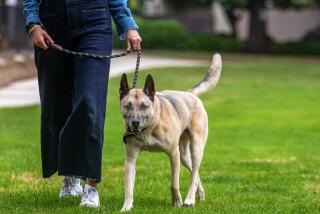Exercising Discipline
- Share via
Though I consider unnecessary exertion to be the eighth deadly sin, I walk Shadow a mile into town nearly every Saturday and Sunday morning. I do this for general fitness, and my breakfast. But mainly I do it for Shadow, my 6-year-old, black Labrador retriever. Originally bred for hunting and retrieving downed game, Labs are intelligent, healthy, good-natured, gentle and clean. Unfortunately for me, they also need plenty of exercise, because they are outdoor dogs. Shadow has clearly come to consider these weekend walks among her inalienable canine rights. I know this because only on weekends will she enter the bedroom, something that as a pup she was taught not to do. Her breeder gave me an excellent piece of advice: Don’t let a four-pound puppy do anything you don’t want a 70-pound adult doing--like climbing into bed. But on weekends, if I don’t get right up, there will be a series of escalating violations that begin with her snuffling loudly at the electric blanket and end with the canine equivalent of terrorism: driving her whole head beneath the covers and barking.
It isn’t as though she doesn’t get plenty of exercise: Every afternoon--including weekends--I walk her to a nearby playground and throw a tennis ball around. Yet on those rare, weekend mornings when she doesn’t get her walk, I may come home to find another leg chewed off the cedar chest.
Shadow’s conduct on these occasions bears a startling resemblance to spite. Because I am never sure exactly how to correct these destructive behaviors, nor even if I should try, I called on Deena Case, a Ventura County animal behaviorist. Case works as a consultant to veterinary hospitals and public agencies that have problems with animals, and she also works with individuals, helping them to pick the right animal or to improve what she calls “the people-pet relationship.”
“There’s usually a simpler explanation than spite,” says Case. “Anxiety, hunger, fear, loneliness and excess energy can cause behaviors that can look like spite. An animal left alone might be frightened by loud noises while its owner is gone. Or an animal--like a child--may feel an intense separation anxiety. This can be triggered by someone putting on a coat or jingling car keys.
“Once we figure out the cause of an animal’s objectionable behavior,” she continues, “then we can figure out what to change so that the behavior stops. If the cause is fear, and the source can’t be changed, then we’ll try to desensitize the animal to it. Once the animal stops being frightened, the problems disappear.” Shadow’s behavior, Case suggests, may be the result of a well-exercised, outdoor dog’s unspent energy.
Some of Shadow’s behavior still seems like spite to me, but, Case warns, “if an owner thinks, ‘The animal is getting back at me,’ then there’s a punishment-oriented mind-set. It’s pointless to punish animals for acts you don’t catch them doing. In fact, it’s usually counterproductive because animals’ association time is short, but their memories are long. They won’t have any idea why they’re being punished, but they’ll remember you punished them--that you were the source of fear and pain.”
Since punishment would be ineffective if I get home after Shadow has demolished something, what do I do when I can’t exercise her? Case suggests that the only practical solutions are to have a neighbor walk her or to lock her out of the house until I get home.
Case adds that some canine behavior problems can stem from genetic conflicts caused by mixing breeds that have non-complementary natures. She mentions a corgi-chow mix she once wanted to study: “Corgis are highly social animals, while chows are standoffish. The poor animal was very unhappy. It didn’t know whether to say hello or goodby.” She calls this a “conflicted” personality.
At the playground every day, I see an example of a conflicted personality--a Labrador retriever-Australian shepherd mix. Australian shepherds have strong herding instincts. At the playground, this poor animal is torn between wanting to chase the tennis ball himself and wanting to herd Shadow while Shadow tries to retrieve it.
Shadow’s instinct to retrieve is strong because she’s a purebred, and her personality is not at all conflicted. She knows exactly what she wants: to eat, accompany me on my walks and retrieve tennis balls. Having her chase a tennis ball daily is an ideal form of exercise for both of us: I rarely have to move very much. It also keeps my house unchewed. Plus, she’s energetic, happy and in excellent condition, to judge by the stunning speed with which she covers the distance between her wicker basket and the spot where food is dropped. So, I’ll keep walking her into town on weekends. She needs exercise; I need breakfast.






